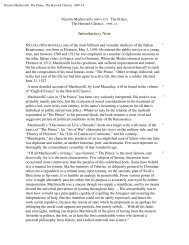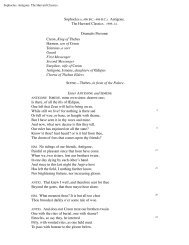Notre Dame de Paris - Bartleby.com
Notre Dame de Paris - Bartleby.com
Notre Dame de Paris - Bartleby.com
You also want an ePaper? Increase the reach of your titles
YUMPU automatically turns print PDFs into web optimized ePapers that Google loves.
it in his turn, felt some qualms of <strong>com</strong>passion for the poor <strong>de</strong>vil un<strong>de</strong>r sentence, and in the hope of<br />
obtaining some mitigation of his penalties, bent as near as he could to the examiner’s ear, and said,<br />
pointing to Quasimodo, “The man is <strong>de</strong>af.”<br />
He hoped that the knowledge of a <strong>com</strong>mon infirmity would awaken Maître Florian’s interest in favour<br />
of the con<strong>de</strong>mned. But in the first place, as we have already explained, Maître Florian did not like to<br />
have his <strong>de</strong>afness <strong>com</strong>mented upon; and secondly, that he was so hard of hearing that he did not catch<br />
one word the clerk was saying. Desiring, however, to conceal this fact, he replied: “Ah! that makes all<br />
the difference. I did not know that. In that case, one more hour of pillory for him.” And, the modification<br />
ma<strong>de</strong>, he signed the sentence.<br />
“And serve him right too,” said Robin Poussepain, who still owed Quasimodo a grudge; “that’ll teach<br />
him to handle folks so roughly.”<br />
II. The Rat-Hole<br />
WITH the rea<strong>de</strong>r’s permission we will now return to the Place <strong>de</strong> Grève, which was quitted yesterday<br />
with Gringoire, to follow Esmeralda.<br />
It is ten in the morning, and everywhere are the unmistakable signs of the day after a public holiday.<br />
The ground is strewn with débris of every <strong>de</strong>scription, ribbons, rags, plumes, drops of wax from the<br />
torches, scraps from the public feast. A good many of the townsfolk are “loafing about”—as we would<br />
say to-day—turning over the extinguished brands of the bonfire, standing in front of the Maison aux<br />
Piliers rapturously recalling the fine hangings of the day before, and gazing now at the nails which<br />
fastened them—last taste of vanished joy—while the ven<strong>de</strong>rs of beer and ci<strong>de</strong>r roll their casks among the<br />
idle groups. A few pass to and fro, intent on business; the tra<strong>de</strong>speople gossip and call to one another<br />
from their shop doors. The Festival, the Ambassadors, Coppenole, the Pope of Fools, are in every mouth,<br />
each vying with the other as to who shall make the wittiest <strong>com</strong>ments and laugh the lou<strong>de</strong>st; while four<br />
mounted officers of the peace, who have just posted themselves at the four corners of the pillory, have<br />
already drawn away a consi<strong>de</strong>rable portion of the idlers scattered about the square, who cheerfully<br />
submit to any amount of tediousness and waiting, in expectation of a little exhibition of Justice.<br />
If now, after contemplating this stirring and clamorous scene which is being enacted at every corner of<br />
the Place, the rea<strong>de</strong>r will turn his attention towards the ancient building—half Gothic, half<br />
Romanesque—called the Tour-Roland, forming the western angle of the quay, he will notice, at one of<br />
its corners, a large, richly illuminated breviary for the use of the public, protected from the rain by a<br />
small penthouse and from thieves by a grating, which, however, allows of the passer-by turning over the<br />
leaves. Close besi<strong>de</strong> this breviary is a narrow, pointed window looking on to the square and closed by an<br />
iron cross-bar, the only aperture by which a little air and light can penetrate to a small, doorless cell<br />
constructed on the level of the ground within the thickness of the wall of the old mansion and filled with<br />
a quiet the more profound, a silence the more oppressive, that a public square, the noisiest and most<br />
populous in <strong>Paris</strong>, is swarming and clamouring round it.<br />
This cell has been famous in <strong>Paris</strong> for three centuries, ever since Mme. Rolan<strong>de</strong> of the Tour-Roland,<br />
mourning for her father who died in the Crusa<strong>de</strong>s, had caused it to be hollowed out of the wall of her<br />
house and shut herself up in it forever; retaining of all her great mansion but this one poor chamber, the<br />
door of which was walled up and the window open to the elements winter and summer, and giving the










